The State of Qatar stressed that the recovery from long decades of conflict and deteriorating human rights conditions in Afghanistan now faces increasing challenges in the humanitarian, economic, and living fields, as well as critical human rights conditions, especially the rights of women and girls, their fundamental freedoms, and their right to obtain education and work, stressing the necessity of continuing efforts to provide support, and continuing dialogue between all parties to reach effective and sustainable solutions.
This came in the State of Qatar's statement delivered by Deputy Permanent Representative of the State of Qatar to the United Nations Office in Geneva, Jowhara bint Abdulaziz Al Suwaidi, during the enhanced interactive dialogue with the Special Rapporteur on the situation of human rights in Afghanistan, within the framework of the 56th session of the Human Rights Council in Geneva.
Al Suwaidi said that the State of Qatar was keen to provide humanitarian and development aid to Afghanistan, noting that the total aid during the period from 2021-2024 reached 1,080 tons, in addition to sending aid to those affected by the floods that recently struck the Baghlan province in northern Afghanistan.
She indicated that work is underway to build an integrated specialized hospital for women and children, in addition to joint projects to support education in cooperation between the Qatar Fund for Development (QFFD), the Education Above All Foundation (EAA), and Afghanistan's Ministry of Education.
Al Suwaidi pointed out that the State of Qatar continues to host meetings related to the Afghan issue, and is preparing to host the third meeting of special envoys on Afghanistan, organized by the United Nations in Doha at the end of June to find more communication and coordination between the international community and the Afghan caretaker government to develop and implement humanitarian and development programs, promote and protect human rights, and ensure a decent life for the Afghan people.

